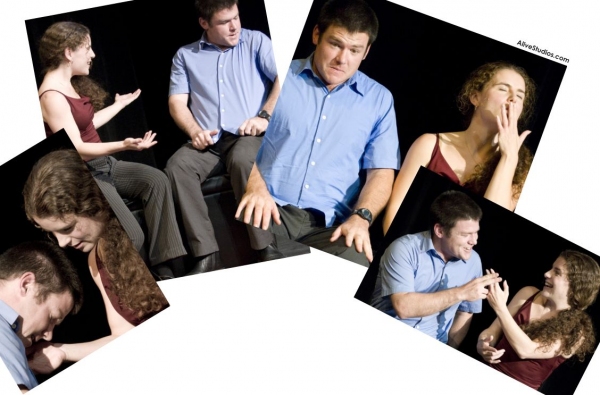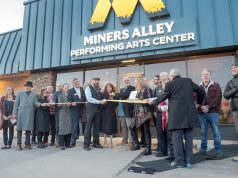
In the performance space at Boulder’s Wesley Chapel, Gemma Wilcox jumps into the room, tugging her boots off while she walks to the stage, while Sam Elmore strides in behind her. The two actors play a couple in the two-person theater piece 52 Pick Up, and first became friends when Wilcox held auditions for the male counterpart more than five years ago.
The story of the play is simple. Imagine your classic failed relationship. Boy meets girl, they fall in love, and eventually the coupling ends. Now imagine that story split into 52 different moments, correlated to a deck of cards. Wilcox and Elmore come out at the beginning of the play, throw a deck of cards in the air, and then proceed to pick one up and act out the scene until no cards remain. Each performance of the play, as a result, is drastically different.
52 Pick Up was first written and performed by TJ Dawe and his romantic partner at the time, Rita Bozi.
Wilcox, longtime friends with Dawe, saw him act out the play in Canada several years ago and asked if she could perform it herself. After finding Elmore, the two went on to perform the play, winning the Best-of-Fest award at the Boulder International Fringe Festival in 2008.
The two actors joke about their personal relationships throughout their time with the show.
“It’s been a wild ride with you, I remember the drive down to Austin you were going through something,” Elmore says, grinning.
“Are you sure it wasn’t Fresno?” Wilcox says as she starts laughing. “I remember being in a coffee shop with you and just crying about something.”
The two talked about how different they’ve become since the first time they did the show five years ago. Elmore, who’s since gotten married and bought a house, mentioned the way the play has been helpful for him, too.
“It’s given me more access to parts of myself,” he says. “It’s really fun to perform and has a positive effect on me.”
Each of the 52 scenes lasts anywhere from 30 seconds to three minutes, resulting in an 80-minute long play. The entire relationship is acted out, but the order changes night to night. It could start with the breakup and end with the first kiss.
“It is part of the excitement of performing it and watching it, I believe,” Wilcox says.
“We’ve had shows where the first 10 cards are heavy-duty breakups and all have to do with the last few months of the relationship when things aren’t going so well, and that creates a very different effect on the audience. They know the relationship’s going to end with all the heaviness,” Wilcox says.
“But then we’ve had other shows where all the first scenes are the highs of love and the honeymoon stage and the bliss of falling in love, and so that has a very different effect and they have a different investment in the couple.”
As Wilcox discusses the different elements of the play, Elmore begins to set up the stage. The props used for the play are quite sparse, with just two red shiny chairs and two red pillows on the ground, but they use the set economically. The two chairs turn into a car at one point, and the two pillows turn into a bed.
Wilcox admits that wiping the slate clean after every scene is a unique aspect of the play, compared to other plays or real life, where one moment builds on the past. The play requires the actors to pivot from one extreme emotion to its opposite. Their director, Elizabeth Baron, was a big part of the training process.
“She kicked our asses to really find these characters and make them sharp and clear,” Wilcox says. Baron trained them to compartmentalize the emotion of each scene, so that they could jump from an argument scene to a love scene to the time they first met.
“If [the characters] are in an argument, we really stay committed to that level of anger towards each other … [and] don’t let that lessen just because we had a lovey-dovey scene the time before,” Wilcox says.
It’s not the order that most impacts how the two actors react to the scenes, they say. Rather, it’s what’s happening in their personal lives.
Elmore, who was sweeping the stage while Wilcox was speaking, stops and leans on the broom.
“There is variety from show to show depending on the order, but also just depending on us and what’s happening outside of our lives, too, that can influence us,” he says.
When asked what she hoped the audience would leave the performance with, Wilcox looks over at Elmore, and he steps in to answer.
“It’s a sense that sometimes relationships can be so consuming, we can’t always get that bird’s-eye view. This show, for me, helps put relationships into perspective,” Elmore says, taking a seat on one of the red chairs.
Both actors talk about the way what they’re currently going through comes out in the play.
“It’s been incredibly healing, I’ve had a couple of relationships end, and it’s been kind of cathartic to start shouting and letting that through,” Wilcox says.
Respond: [email protected]
Correction: This article originally misspelled the name of Elizabeth Baron.














